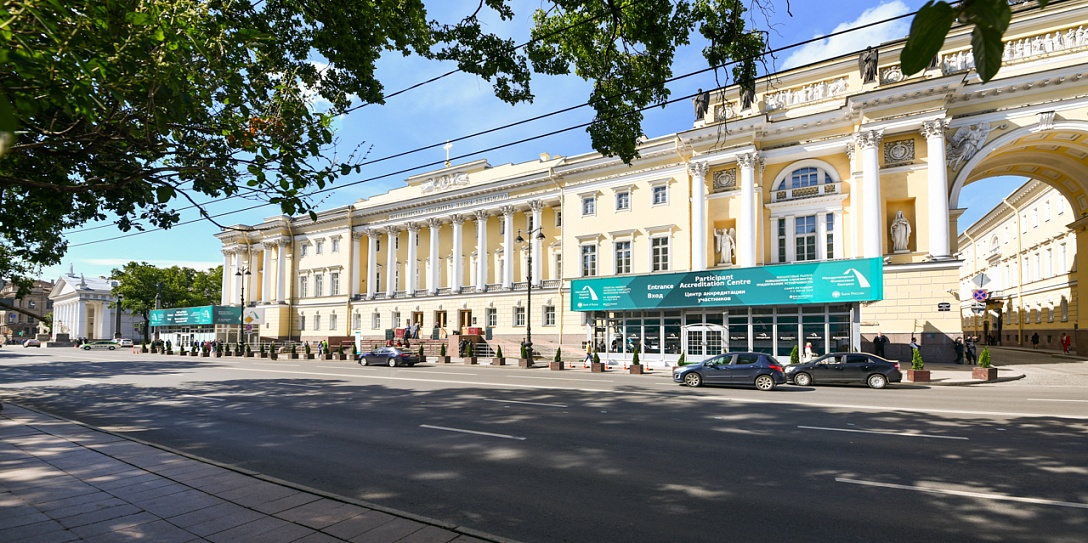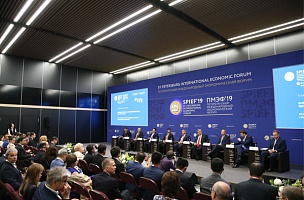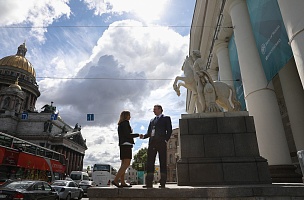The events of the 28th International Financial Congress came to a close in St. Petersburg. The main theme of the Congress was ‘Financial Markets: Increasing Complexity, Maintaining Stability’. The International Financial Congress was organized by the Bank of Russia and the Roscongress Foundation.
Governor of the Bank of Russia Elvira Nabiullina opened the business programme of the Congress. In her speech, she emphasized the need for structural changes and fundamental improvement of the investment climate to ensure the growth of the Russian economy. «It’s only the transformational change of structure that is to ramp up the potential, utilize all the economic scope to boost the growth rates and ultimately to enhance people’s well-being. Transformations that are to contribute to the redistribution of resources, labour and economic forces into industries with greater impact, greater productivity, with greater added value. The main thing that needs to be done for the economy to snowball is a radical improvement of the investment climate,» noted Elvira Nabiullina.
«We still need to make a better business environment, which will take a lot of time and effort. What can and must the financial system do to boost economic growth in this situation? The financial system must become part of structural changes through forming a long-term investment resources, developing stock market, and aiming at financing effective projects,» added the Governor of the Bank of Russia.
The Congress included 2 plenary sessions, 43 business sessions, and the business breakfast co-organised by of the Bank of Russia and The Bell Club.
The events of the Congress were attended by delegated from the Bank of Russia and foreign central banks, international financial organizations, of the largest banks and professional associations, and established international and Russian experts — a total of more than 1,200 participants and media representatives from Russia and 37 countries including Argentina, Armenia, Austria, Azerbaijan, Bangladesh, Belarus, Belgium, Bermuda, Brazil, China, Croatia, Cyprus, the Czech Republic, Denmark, Egypt, Finland, France, Germany, Greece, Hungary, Italy, Japan, Jersey, Kazakhstan, Moldova, the Netherlands, Portugal, Serbia, Spain, Switzerland, Thailand, Turkey, the UK, Uruguay, the USA, Uzbekistan, the Virgin Islands. The USA, the UK, Germany and France sent the largest delegations. It was for the first time that delegates from Azerbaijan, Bangladesh, Bermuda, Denmark, Thailand, and Uruguay took part in the IFC.
The panellists included Governor of the Bank of Russia Elvira Nabiullina, Head of the Monetary and Economic Department of the BIS Claudio Borio, Economics Professor at London Business School Richard Portes, Director of the MPA Program in Economic Policy Management at Columbia University’s School of International and Public Affairs Patricia Mosser, Governor, Croatian National Bank Boris Vujčić, Partner of the Management Consulting Department, KPMG Czech Republic Zdenek Tuma, Executive Director of the Reinventing Bretton Woods Committee Mark Uzan, Professor of Brandeis International Business School Stephen Cecchetti, Senior Advisor, Financial Stability Institute, Bank for International Settlements Patrizia Baudino, Director, Head of Support for Economics and Statistics, Bank of Italy Giuseppe Bruno, Resident Representative for Russia, IMF Gabriel Di Bella, Representative of the FinTech Innovation Department, Bank of France Laurent Camus, Deputy Head of the Banking Conduct Supervision Department, Bank of Portugal Tiago Aguiar, representatives of the EAEU central banks and of largest Russian financial institutions. Laureate of the Nobel Peace Prize Muhammad Yunus who was awarded the Prize in 2006 «for their efforts to create economic and social development from below» delivered a speech at the IFC-2019.
The ‘Central Bank’s Policy Design: Pursuing Multiple Objectives in Times of Increasing Market Complexity and Risk Variety’ plenary session was the key event of the Congress’s first day, on 4 July. The panellists focused on the policies of emerging market central banks to combine measures aimed at providing monetary and financial stability in an era of high global market volatility.
New approaches to finance for house construction, challenges for the EME central banks’ policies amid global uncertainty, infrastructure projects for the financial market, digital transformation and cyber risks in the financial sector, approaches to the regulation of financial groups were among the topics of the first day’s sessions.
The ‘Self-Regulation, Ethics, and Conduct Supervision: Challenges for the Next Three Years’ plenary session kicked off the second day of the Congress. The participants of the sessions discussed growth of non-state pensions, macroprudential policy, compliance, and anti-money laundering legislation, and other aspects of financial market operations.
On the first day of IFC-2019, 3 July, the Bank of Russia held a conference entitled ‘The effectiveness of Macroprudential Policies: Theory and Practice’. The conference focused on identification and evaluation of risks to financial stability, optimal monetary and macroprudential policies, and effects of macroprudential policy. discussed how financial vulnerabilities and bank resilience affect medium-term macroeconomic tail risk, how emerging economies handle commodity cycles and financial instability, bank safety and the use of regulatory capital, the search for robust macroprudential policy, and other issues.
The conference was attended by representatives of the Bank of Russia, the Bank of England, the Bank of Spain, Danmarks Nationalbank, the Central Bank of Armenia, the European Central Bank, the International Monetary Fund, as well as representatives of the scientific community from leading institutions such as London Business School, the NRU Higher School of Economics, and Columbia University.
IFC-2019 participants attended Boris Eifman’s ballet ‘Russian Hamlet’ at Aleksandrinsky Theatre and reception held by the Bank of Russia.
The sporting programme included the ROSCONGRESS CUP squash and Russian billiard (free pyramid variation).
11 organizations served as sponsors and partners of the International Financial Congress.
General Sponsors — VTB Bank and Russian Agricultural Bank.
General Partners — Sberbank and Bank DOM.RF.
National Partner — MIR National Payment System.
Partners — Moscow Exchange Group, Sovcombank, Goznak, the Russian Association of Cash-in-Transit Services (ROSINKAS), FinCERT, Baikal Pearl.
16 Russian and foreign agencies served as media partners.
General Media Partners — Vedomosti Business Daily and Interfax Information Services Group.
Media Partners — Kommersant, Prime Business News Agency, BellClub, Rossiyskaya Gazeta Editorial, Forbes, RBC, Modern Insurance Technologies Magazine, Banking Review, Banking Technologies Magazine, Insurance Today Media Information Group, Banki.ru, BIS Journal, Cbonds, PLUS Journal and PLUSworld.org.
The expert and analytical support for the International Financial Congress involved 18 specialists in finance from St. Petersburg State University of Economics. They will present a set of summaries reviewing the business programme takeaways.
Transcripts and videos of the IFC Business Programme will be available on the website https://ibcongress.com.






